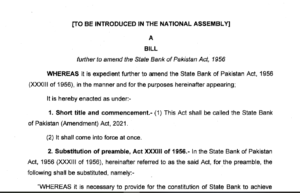Both measures are largely Ashraafist. Serving or saving the Riyasati Ashrafiya and Ashrafiya from the tax-burden.

The GST (General Sales Tax) may be delayed and/or levied in parts/instalments/gradually. I.e. On some items, and say 5% and then gradually may be increased with time, but must remain below the single digit limit, as recommended by the Prime Institute. If they need to raise this or that amount, they should cut the size of the government and cut the noncombat defense expenditures. Also, they should withdraw all tax exemptions/perks and privileges available to various classes of Riyasati Ashrafiya and Ashrafiya. But that’s not the case. That’s why I called it Ashraafist.
As for the SBP (State Bank of Pakistan) bill. Have a look at it and two things are noticeable.
First is, no more loans to the government by the SBP. That’s fine.
Second, the SBP immunity from any court proceedings, i.e. no one can go to the courts against any thing done by the SBP. That’s somehow problematic, and Ashraafist. Yes, I know courts should act cautiously when taking up pleas/petitions (including suo motos) against policy decisions (practically they have done that, too, too selectively). But no government decisions be given absolute status, i.e. something not to be questioned, or something unquestionable. So is with the SBP.
In sum:
Somehow this bill envisages absolute autonomy for the SBP. In a constitutional/political setup, in principle, no institution is beyond the reach of the Parliament. Therefore, SBP too must be accountable to the Parliament. Is there any such thing in the bill? I think No.
Also, such measures need to be thought out/implemented with a longer term perspective, not on a short-term basis.
No doubt, I stand for autonomy of institutions, but that doesn’t mean absolute autonomy. Politically it’s only the will of the people, in a setup, that is absolute. But in such a setup too, it’s other things that condition it. Such as, fundamental rights. That’s why all the institutions must be accountable to the Parliament. Where there that’s not the case, there prevails organized anarchy; as prevails in Pakistan.

